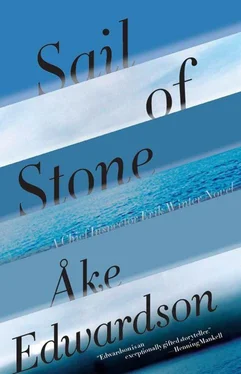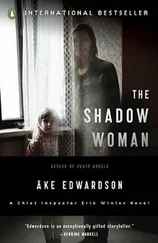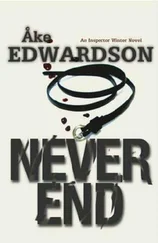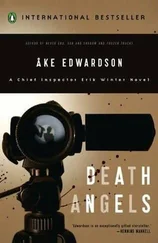He was surprisingly tall, almost as tall as Macdonald, who was the tallest Scot Winter had seen yet. Winter had commented on this earlier. I kept away from the haggis, Macdonald had said. It pushes you toward the earth. It’s like rice for the Japanese.
Bullshit, Winter had said.
It was a conversation that Winter hardly understood; actually, he didn’t at all. The man spoke an awful gibberish, and Winter suspected that Macdonald was guessing at half of it. And suddenly the conversation was over, without ceremony. It was like watching a sport you didn’t understand.
They walked back to the car on Richmond. A double sheet of newspaper blew across the main road to Portessie. Winter could see half a headline, like half a message.
“He’s unemployed, but he goes there for old times’ sake,” said Macdonald. “He’s not alone in that.”
“But he hadn’t met any Johnson or Osvald or anything, from what I understand.”
“No.”
“But our man could have been here,” said Winter.
“Which one?”
“Well, that’s one of the questions,” said Winter.
They drove slowly back through the harbor district: Harbour Office, Marine Accident Investigation Branch, Carlton House, Fisherman’s Fishselling Co. Ltd., JSB Supplies Ltd., Buckie Fish Market. Winter could see trawlers in the small wet dock; he read off the boats’ sterns: Three Sisters, Priestman, Avoca, Jolair, Monadhliath.
“We might as well ask at the Marine,” said Macdonald.
The Marine Hotel looked like it had been taken from a noir film. If walls could talk, Winter thought as they stood in the lobby. The woman behind the desk was a dyed blonde and maybe fifty and had lively eyes. Behind her was a sign for the “Cunard Suite,” which must have been the most charming the hotel had to offer.
But even in the lobby there was wall-to-wall carpeting.
Winter noticed that the carpets covered all surfaces. The British had a special relationship with wall-to-wall carpeting, as though the myth of British properness was reflected in these carpets that had to cover all naked floors.
Their colors were reminiscent of the hammer man’s coverall.
“I’ll get the man’ger fur ya, luv,” she said, and lifted the telephone receiver.
They stood on the square, Cluny Square. There was a hotel in front of them that looked like a castle. The Cluny Hotel. It was the lunch hour. Winter could see a group of little old ladies mince their way in through the hotel’s wide entrance. Time for tea.
“So,” said Macdonald about the conversation they’d had with “the man’ger.”
“Could be the old man making a return visit,” said Winter.
“Could be any nostalgic at all,” said Macdonald.
“This isn’t a nostalgic,” said Winter.
“What is he, then?” said Macdonald.
“According to all reports, dead since the war,” said Winter.
“Well, then there’s probably not much nostalgia left.”
“Shall we have a cup of tea?” said Winter, nodding toward the hotel.
Macdonald looked at his watch.
“Okay,” he said.
“When were the girls getting to Dallas?” said Winter.
“About the same time as us,” Macdonald said, and smiled.
The hotel had been built in 1880, Victorian up to its trusses. It had six rooms and a dining room in all the shades of pink God had given to man. A young woman who looked nice showed them to a table that seemed fragile. The chairs were narrow armchairs.
Macdonald looked like he was sitting in a child’s chair. Winter realized that he looked the same himself.
The little old ladies were sitting at a larger table next to one of the windows, ten feet away. They smiled at them, someone giggled; a few whispered.
“Good morning, ladies,” Macdonald said, and Winter nodded as well.
A wide, rounded staircase led down from the dining room. Framed black and white photographs hung on the wall all the way down to the reception desk. It was, you could say, a nostalgic display, or a sad one. Most of the pictures showed the former fishing fleet, when it had been proud and great: In the photos from the harbor there didn’t seem to be room for all the boats. Masts stretched as far as the eye could see, like tree trunks in a forest. Like mobile trees. Winter thought of Macbeth again as he stood there looking at the forest of masts. Not until the forest moved toward him did Macbeth have to fear anything in his castle.
He had the witches’ shrill word on it.
Macbeth shall never vanquish’d be until
Great Birnam wood to high Dunsinane hill
Shall come against him.
And no man born of woman could threaten him.
But Macduff, the man born by Cesarean section, cut down the trees and fastened them to his body and marched.
Winter moved his eyes from the photograph of the masts.
They continued down the stairs, past other pictures, of houses, more boats, of people from other times.
They stood on the street again. The Buckie boys are back in town. Arne Algotsson’s demented drivel popped up in Winter’s memory. It really must mean something. Was John Osvald a Buckie boy? Or was it just an expression? They had asked, but so far no one had known.
On the square was a war monument for World War I. Winter stood in front of it and thought the impossible thought that he had seen it before. He read on the stone: “Their Name Liveth For Ever.”
They were alone in front of the monument. That said something to him too, but he didn’t know what. It meant something that they were standing there alone.
On the north side of the little square was a building that looked like a community center. There was a sign, but it was on the wall and they didn’t notice it: “Struan House-Where older people find care in housing.”
Two old people were sitting on a bench on the opposite side of the square.
“Well,” said Macdonald.
They walked to the car, which was parked in front of the Buckie Thistle Social Club.
“The local football gang,” said Macdonald. “Buckie Thistle.”
“I know Patrick Thistle,” said Winter.
“Do you? The Glasgow gang?”
“Yes.”
“I’ll be damned. They’re in division two now, I think, but they’re the favorites for all the celebrities.”
They got into the car and rounded the hotel. Macdonald pushed a disc into the CD player and a woman from the past started to sing about lost love and bittersweet dreams.
“Patsy Cline,” said Macdonald.
Winter suddenly felt sad. They were back on the A96, driving south to Dallas. It was a no-man’s-land here, no sea, no mountains. Patsy Cline sang about another life, or rather cried: Sweet dreams of you, every night I go through, why can’t I forget you and start my life anew, instead of having sweet dreams about you.
Aneta Djanali felt herself freeze under the water. She grabbed the edge of the bathtub.
She heard one step, two steps.
A harsh sound from the kitchen or the hall.
Another harsh sound.
The bathroom door was half open.
She had a telephone on the wall out there, but it was ten thousand miles away.
Stay calm, stay calm, stay calm, stay calm.
Her heart started to beat like a hammer, donk-donk-donk-donk.
“WHO IS IT?” she yelled.
And now she was already up out of the bathtub and into her robe and she kicked the door hard with her heel and the door flew into the wall without hitting anyone and the hall was empty and untouched, and she couldn’t hear any harsh sounds now.
She stood in the doorway and yelled:
“IS SOMEONE THERE?”
Nothing.
She heard sounds from out in the stairwell, could be anything. A car honked on the street below. Life continued outside her apartment, but in here it felt like it was holding its breath, taking a break. Waiting. Waiting for what? She took a step forward and one into the kitchen, but there was no one there.
Читать дальше












